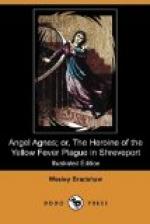Author: Wesley Bradshaw
Release Date: December 2, 2005 [eBook #17200]
Language: English
Character set encoding: ISO-646-us (us-ASCII)
***Start of the project gutenberg EBOOK angel Agnes***
E-text prepared by Mark Meiss from page images and corrected digital text generously provided by the Wright American Fiction Project (http://www.letrs.indiana.edu/web/w/wright2/) of the Library Electronic Text Service of Indiana University
Note: Project Gutenberg also has an HTML version
of this
file which includes
the original illustrations.
See 17200-h.htm
or 17200-h.zip:
(http://www.gutenberg.ne
t/dirs/1/7/2/0/17200/17200-h/17200-h.htm)
or
(http://www.gutenberg.ne
t/dirs/1/7/2/0/17200/17200-h.zip)
Images of the original pages are available through the Wright American Fiction Project (http://www.letrs.indiana.edu/web/w/wright2/) of the Library Electronic Text Service of Indiana University.
ANGEL AGNES:
Or, the Heroine of the Yellow Fever Plague in Shreveport.
The Strangely Romantic History and Sad Death of Miss Agnes Arnold, the Adopted Daughter of the Late Samuel Arnold, of This City.
Wealthy, Lovely, and Engaged to Be Married, Yet
This Devoted Girl Volunteered to Go and
Nurse Yellow Fever Patients at
Shreveport, Louisiana.
After Three Weeks of Incessant Labor She Met with
a
Painful and Fatal Accident.
She Died in the Hope of a Blessed Immortality.
Her Intended Husband, Who Had Followed Her to
Shreveport, Had Already Died, and the Two
Were Buried Side by Side.
Terrible Scenes during the Plague.
by
Wesley Bradshaw.
Issued by
Old Franklin Publishing House in Philadelphia, Pa.
Entered according to Act of Congress, in the year
1873, by
C. W. Alexander, in the Office of the Librarian of
Congress at
Washington, D.C.
* * * * * *
[Advertisement]
Geo. Woods & Co’s Parlor Organs.
[Illustration: Organ]
Their combination solo
Stops
are capable of the most beautiful
musical effects.
* AEOLINE—A soft or breathing
stop.
* Vox HUMANA—A baritone
solo, not a fan or tremolo.
* Piano—Which will
never require tuning.
Few are aware of the perfection the Parlor Organ has reached, the variety of musical effects of which it is capable, and how desirable an addition it is to the parlor. These instruments have created much interest and enthusiasm by reason of their quality of tone, elegance of finish and musical effects.
The Profession and Public generally
are earnestly invited to examine
these beautiful instruments at our
own or agents’ warerooms, and
compare them with other instruments
of their class.




